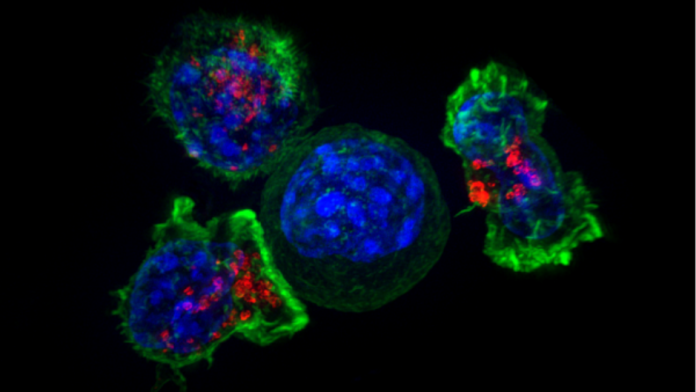A virus is something you normally want to avoid, but sometimes, you have to use something bad to beat something worse. (JURASSIC WORLD SPOILERS AHEAD) It’s like in Jurassic World, when she lets the T-Rex out to help fight the Indominus Rex. Except the T-Rex is a virus and the Indominus is cancer. (SPOILERS OVER)
Oncolytic viruses are viruses meant to kill cancer cells. It’s quite clever: many of the features that make cancer cells cancer cells, like excessive growth, also render them more susceptible to viral infection. This means that viruses can selectively target cancer cells with very little damage to normal tissue. With funding from the Movember Foundation and Prostate Cancer Canada, a team led by Dr. John Bell from the Ottawa Hospital Research Institute and the University of Ottawa, is developing an oncolytic virus for prostate cancer therapy.
The enemy of my enemy is my friend
The idea of using viruses to treat cancer is not entirely new. As early as the 1800s doctors noticed that some cancer patients went into remission after viral infection. You might even remember the Grey’s Anatomy storyline way back in season four when Meredith uses a virus to treat inoperable brain tumours.
In fact, several real clinical trials of viral therapies for cancer are currently underway and, just over a month ago, the FDA approved a genetically engineered virus to treat advanced melanoma (skin cancer). But as researchers study the viral mechanisms in more detail, they can begin to further improve upon treatment efficacy.
Helping the immune system
One of the reasons tumors are so hard to get rid of is that they have the capacity to evade the immune system. Recent studies have shown that oncolytic viruses work so well partially because they help trigger an immune system response against the cancer. When the virus kills a cancer cell, it causes it to release all its components, including some things that can stimulate immune attack.
Now researchers are additionally genetically modifying oncolytic viruses to increase this immune response. Some of the tumour is killed directly by the viral infection, and the rest is taken care of by the alerted immune system. An oncolytic virus can also be combined with other anti-cancer drugs or even another oncolytic virus for a one-two punch against cancer.
Ideally, Dr. Bell hopes to eventually help patients whose prostate cancer has spread and become resistant to conventional treatment.
Want more Movember-funded Canadian research? Check out this and this.








































